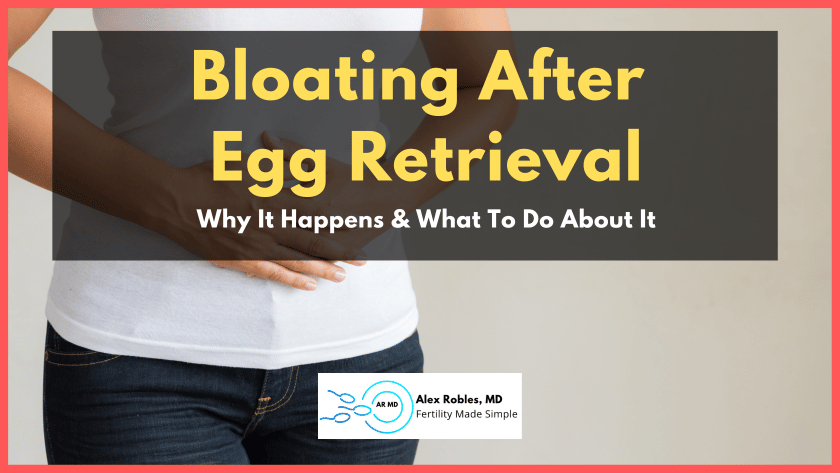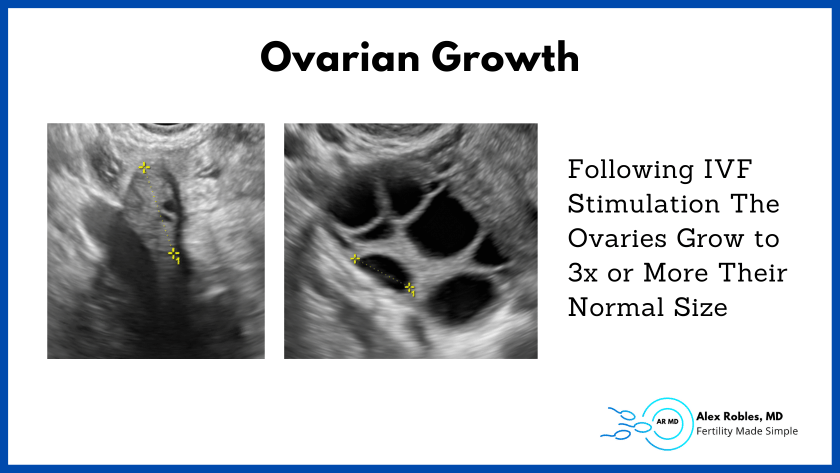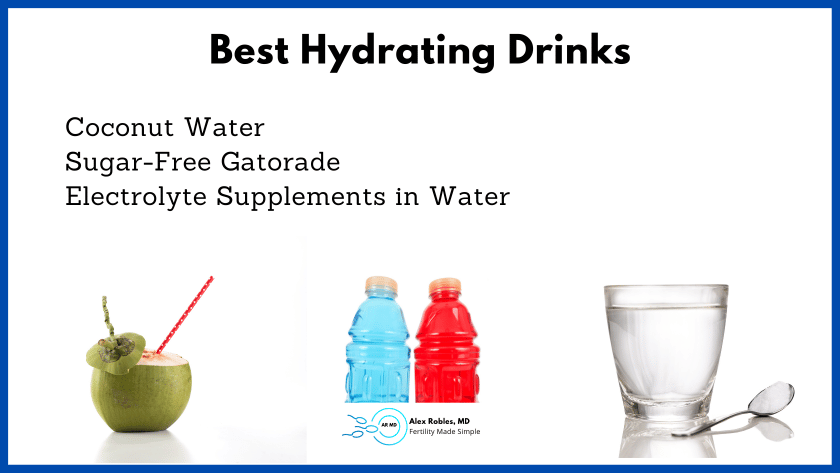Bloating is one of the most common side effects following an egg retrieval.
It can be uncomfortable, but it is temporary and expected.
In this post, you will learn what causes bloating and how to alleviate it.

What Causes Bloating After An Egg Retrieval?
There are several potential causes of bloating after egg retrieval. Some of the most common are:
- Fluid retention due to medications and the procedure
- Soreness or inflammation in the pelvic area
- Gastrointestinal issues such as constipation
Fluid retention
We use a small needle to puncture your follicles and extract the eggs during the procedure.
As such, some bleeding and fluid can accumulate in the abdomen.
Also, your hormone levels are much higher than usual. One of the hormones, progesterone, causes water retention, which can worsen your symptoms.
Ovarian enlargement
The fertility medications we use during IVF will cause the ovaries to enlarge.
The more follicles you grow, the larger your ovaries will become. This increase in size can cause a sensation of pressure and swelling in the abdomen.
Also, the ovaries will be sore and tender after the procedure.
It takes about seven to ten days for the ovaries to shrink to their normal size.

Gastrointestinal issues
Gastrointestinal issues such as constipation and gas can also contribute to abdominal bloating.
Unfortunately, the IVF medications and the anesthesia can slow down your digestive system.
These can lead to a buildup of gas in the intestine causing more bloat.
Is Bloating Normal/Expected?
It is normal to experience bloating after egg retrieval. It is your body’s natural response to the medications and the procedure.
However, if you notice persistent or severe bloating, contact your healthcare provider.
Other problematic symptoms include fever, pain, vomiting, or excessive weight gain.
How Long Does It Last?
Some women may experience bloating for two to three days, while others may experience it for over a week.
The extent of bloating depends on the number of follicles you had during the IVF treatment.
Generally, the more follicles there are, the more bloating you will experience.
3 Things You Can Do To Alleviate The Bloating
Fortunately, there are several ways to ease bloating after egg retrieval. Here are some tips that can help you recover faster.
Adequate Hydration
After an egg retrieval procedure, it’s essential to prioritize your fluid intake. The IVF process tends to dehydrate you and pull fluid from your circulation.
As such, you need to keep your body more hydrated than usual.
That’s why we recommend hydrating beverages that contain electrolytes rather than pure water. These include coconut water, sugar-free Gatorade, or electrolyte or salt supplements.
Drink at least half your body weight in ounces of water daily. So if you weigh 150 lbs, consume around 75 oz of water daily.

Dietary Changes
Making adjustments to your diet can also help manage post-retrieval symptoms.
Start with small and simple meals that are easy to digest. Large meals can cause discomfort and gastrointestinal upset.
Also, focus on consuming fiber. Fiber-rich foods like vegetables, seeds, and whole grains can help reduce constipation. Avoid eating gassy foods like beans, brussels sprouts, and onions.
Third, avoid excess caffeine, which can cause dehydration and worsen your discomfort.
Pain and Gas Management
Over-the-counter medications like acetaminophen (Tylenol) and ibuprofen can help manage pain and cramping.
You can also use Colace (a stool softener) and Simethicone (a gas-relief medication).
Contact your healthcare provider if your symptoms do not respond to these medications.
A heating pad may also provide mild relief.
Monitoring OHSS: Ovarian Hyperstimulation Syndrome
Recognizing the Symptoms of OHSS
Ovarian Hyperstimulation Syndrome (OHSS) is a potential complication of in vitro fertilization treatments.
OHSS symptoms include bloating, nausea, vomiting, shortness of breath, and rapid weight gain. OHSS can also cause electrolyte imbalances (source).
It’s essential to be aware of these symptoms and report any changes to your fertility doctor.
Prevention and Treatment
Preventing OHSS is crucial during fertility treatments. Your doctor may adjust your medications and the trigger shot.
They may also recommend electrolyte-rich fluids to help maintain your body’s fluid balance.
If you develop OHSS, your doctor will closely watch your condition. Treatment often focuses on relieving symptoms and supportive care. These include proper hydration, medication, and blood work monitoring (source).
In rare cases, severe OHSS may require hospitalization. The good news is the majority of cases are mild.
Other Related Questions
What If I Have Bloating Before The Egg Retrieval?
Bloating before the retrieval is normal as your ovaries enlarge. The level of bloating you can expect correlates with the number of follicles you have.
If your doctor thinks you are at an increased risk of OHSS, they may adjust your treatment plan to reduce the risk.
How Big Can The Ovaries Get?
An average size ovary is around 2 to 3 centimeters. During an IVF cycle, ovaries can grow as large as 10 centimeters or more.
Is It Normal To Have Bloating 5 Days After The Procedure?
It can be normal to experience bloating five days post-egg retrieval. However, if your bloating persists or worsens after 7-10 days, contact your doctor.
Persistent abdominal pain and nausea are also symptoms that need close monitoring.
Final Words On Post-Retrieval Recovery
Bloating is a common side effect of in vitro fertilization treatment. The good news is symptoms usually last a couple of days.
Make sure to rest and drink plenty of fluids.
You can also use dietary changes and over-the-counter medications to manage residual symptoms.
Contact your doctor immediately if you experience severe bloating or other worrisome symptoms.
Related Posts on Fertility Treatment:
